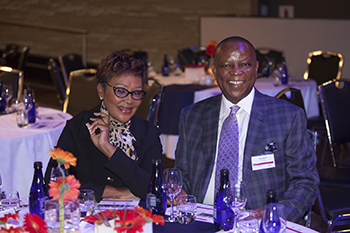
Ms Felicia Mabuza-Suttle and Mr Ndaba Ntsele |
The office of Institutional Advancement at the University of the Free State hosted an event on 9 October 2015 in Johannesburg, to engage prospective partners and donors, to showcase its various projects and programmes, and to recognise existing donors for their contributions.
The event, titled “Revenge of the Caterpillar”, prompted a discussion on the story of change at the University of the Free State, focusing on transformation as well as new ways of advancing a University amidst recent events.
The programme director, Mr Ndaba Ntsele, CEO and Director of Pamodzi Holdings and member of the UFS Council, introduced the Vice-Chancellor and Rector, Prof Jonathan Jansen, to the audience. Mr Ntsele expressed his deep respect and confidence in the Vice-Chancellor and his leadership of the university.
Professor Jansen launched his new book, Leading for Change: Race, intimacy, and leadership on divided university campuses, which offers theoretical grounds for thinking about, and transforming, leadership and higher education worldwide. In the context of his book, Prof Jansen discussed inter-racial relationships among students at the UFS and their experiences, which mirror race relations in the country among communities that have come out of a long history of oppression, such as slavery and apartheid.
Prof Jansen also spoke of the challenges that have surfaced nationally on racial symbols on university campuses. “At the UFS, we have dealt with issues concerning racial symbolism. It is important to lead in times of peace, in order to be able to lead in times of trouble,” he said.
A robust discussion followed, on the way forward for transformation at institutions of higher education, and how this affects communities and the nation at large. The event was attended by representatives of donor and affiliate organisations of the UFS, such the Nedbank Group, The South African Holocaust and Genocide Foundation, and celebrity guests such as Gareth Cliff, Felicia Mabuza-Suttle and Leanne Manas.